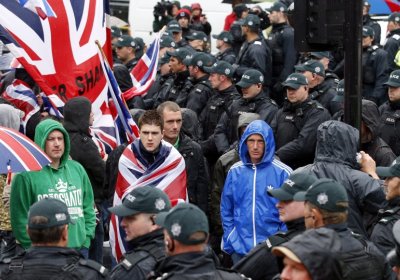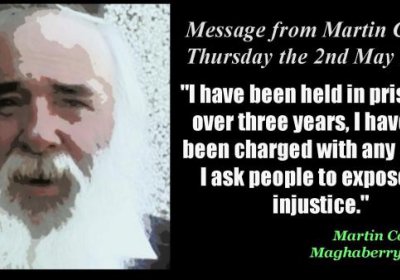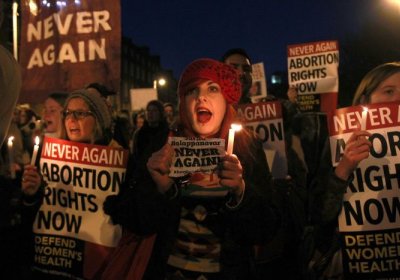The predominantly Catholic and nationalist community of Ardoyne in north Belfast has been subjected to a campaign of violence as part of the sectarian “marching season”.
In recent weeks, the six counties still claimed by Britain have been the scene of violence by “loyalists” — those who support ongoing British rule and the privileges given to the Protestant majority to ensure loyalty to British rule. The article below was published by Irish Republican News on July 19.
* * *
Ireland
Stephen Murney is a political and community activist who lives in Newry in the north of Ireland. He is also a member of Eirigi (“Arise”), a legal, registered Irish socialist republican political party.
Murney has frequently documented, photographed and recorded incidents of harsh Police Service of Northern Ireland (PSNI) stop and searches of people, house raids and other rough treatment in the Newry area. Murney regularly highlighted these issues in local newspapers and on the internet.
Northern Ireland: The Reluctant Peace
Feargal Cochrane
Yale University Press, 2013
368 pp, $38.00
Reginald Maudling, the Tory Home Secretary who oversaw the 1972 Bloody Sunday massacre in Northern Ireland, perfectly expressed the British ruling class’s blend of condescension and indifference towards Ireland when he blurted out to his staff: “For God’s sake bring me a large Scotch — what a bloody awful country.”
As his policies created mayhem on the streets of Ulster, he coined the cute phrase “acceptable level of violence” to describe what was going on.
Martin Corey is a 63-year-old man jailed in the six counties of Ireland's north still claimed by Britain. He has been held for three years without trial.
On April 16, 2010, Corey’s house in Lurgan was visited by members of the Police Service of Northern Ireland (PSNI) and Corey was arrested.
When he asked what the charges were, Corey was told that the police officers “did not know”. All they were told was to arrest Corey.
Sinn Fein president Gerry Adams accused the British government on May 24 of breaching commitments given during peace talks over a decade ago. Adams' comments came after the arrest of leading Donegal Sinn Fein member John Downey.
The 61-year-old was brought before Westminster Magistrates Court to face charges over a 1982 IRA attack in London’s Hyde Park in which four soldiers were killed.
Adams said an agreement forged with the British government at the 2001 Weston Park talks about republicans still pursued over outstanding prosecutions had been breached.
Irish Republican political activist Marian Price was released from jail on May 30 after more than two years of internment without trial, rish Republican News said.
The decision to release Price was taken by the parole commissioners. Price was jailed in the otherwise all-male Maghaberry Prison in the six counties of Ireland's north still claimed by Britain. She was moved to the hospital wing of Hydebank prison in February last year.
Bernadette Devlin McAliskey, veteran Irish civil rights leader, said in response to the case of Irish republican Marian Price, who was returned to jail in 2011: “It is a clear signal to everyone who is not 'on board' and who is not of the same mind as the government that no dissent will be tolerated.
“No dissent will be tolerated and you challenge the status quo at your peril.”.
Sinn Féin President Gerry Adams commenting on the death today of former British Prime Minister Margaret Thatcher.
Plastic bullets were fired and water cannons were used as rioting erupted again in Belfast on January 12 at loyalist flag protests, Irish Republican News said that day.
Belfast has been hit by violent protests and riots in the aftermath of a decision by Belfast City Council to restrict the flying of the Union Jack at Belfast City Hall to 17 days a year.
Thousands of people marched through Dublin on November 17 to protest against the death of dentist Savita Halappanavar, who died of blood poisoning after being refused an abortion.
More than 10,000 people gathered for a vigil and march over the death and the country's draconian abortion laws. A minute's silence was held at Merrion Square by the crowd, followed by chants of “never again”.
Irish doctors appear to have judged that leaving Ms Halappanavar for two days with a fully opened cervix did not present any risk of the infection from which she eventually died.
Thousands of people marched to the offices of Ireland's prime minister on November 17 to support a woman's right to choose. The protest was sparked by the death of Savita Halappanavar in hospital, after staff refused to terminate her pregnancy even though her life was in danger. The article below first appeared on the Irish site Sráid Marx.
* * *
Trouble flared across Ireland's north on the night of July 12 as sectarian Orange Order marchers insisted on marching through nationalist areas, the Morning Star said the next day.
It said serious rioting followed a unionist (supporters of Northern Ireland's union with Britain) parade through the the largely Catholic and Irish nationalist working-class suburb of Ardoyne in north Belfast.
- Previous page
- Page 10
- Next page






